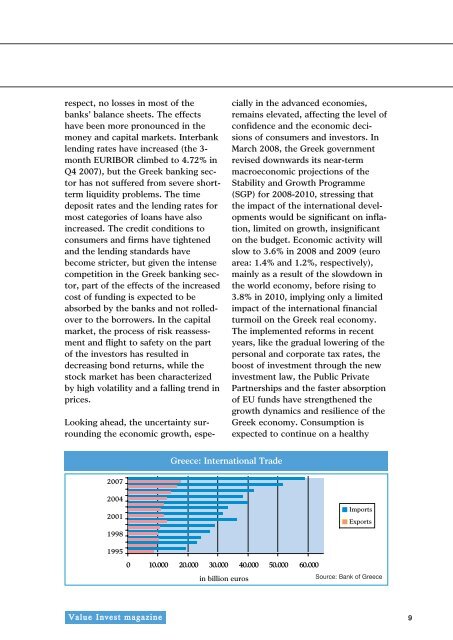VALUE INVEST - Valuation & Research Specialists
VALUE INVEST - Valuation & Research Specialists
VALUE INVEST - Valuation & Research Specialists
You also want an ePaper? Increase the reach of your titles
YUMPU automatically turns print PDFs into web optimized ePapers that Google loves.
espect, no losses in most of the<br />
banks’ balance sheets. The effects<br />
have been more pronounced in the<br />
money and capital markets. Interbank<br />
lending rates have increased (the 3month<br />
EURIBOR climbed to 4.72% in<br />
Q4 2007), but the Greek banking sector<br />
has not suffered from severe shortterm<br />
liquidity problems. The time<br />
deposit rates and the lending rates for<br />
most categories of loans have also<br />
increased. The credit conditions to<br />
consumers and firms have tightened<br />
and the lending standards have<br />
become stricter, but given the intense<br />
competition in the Greek banking sector,<br />
part of the effects of the increased<br />
cost of funding is expected to be<br />
absorbed by the banks and not rolledover<br />
to the borrowers. In the capital<br />
market, the process of risk reassessment<br />
and flight to safety on the part<br />
of the investors has resulted in<br />
decreasing bond returns, while the<br />
stock market has been characterized<br />
by high volatility and a falling trend in<br />
prices.<br />
Looking ahead, the uncertainty surrounding<br />
the economic growth, espe-<br />
2007<br />
2004<br />
2001<br />
1998<br />
1995<br />
Value Invest magazine<br />
Greece: International Trade<br />
cially in the advanced economies,<br />
remains elevated, affecting the level of<br />
confidence and the economic decisions<br />
of consumers and investors. In<br />
March 2008, the Greek government<br />
revised downwards its near-term<br />
macroeconomic projections of the<br />
Stability and Growth Programme<br />
(SGP) for 2008-2010, stressing that<br />
the impact of the international developments<br />
would be significant on inflation,<br />
limited on growth, insignificant<br />
on the budget. Economic activity will<br />
slow to 3.6% in 2008 and 2009 (euro<br />
area: 1.4% and 1.2%, respectively),<br />
mainly as a result of the slowdown in<br />
the world economy, before rising to<br />
3.8% in 2010, implying only a limited<br />
impact of the international financial<br />
turmoil on the Greek real economy.<br />
The implemented reforms in recent<br />
years, like the gradual lowering of the<br />
personal and corporate tax rates, the<br />
boost of investment through the new<br />
investment law, the Public Private<br />
Partnerships and the faster absorption<br />
of EU funds have strengthened the<br />
growth dynamics and resilience of the<br />
Greek economy. Consumption is<br />
expected to continue on a healthy<br />
Imports<br />
Exports<br />
0 10.000 20.000 30.000 40.000 50.000 60.000<br />
in billion euros<br />
Source: Bank of Greece<br />
9


